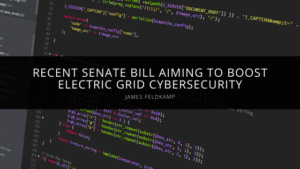James Feldkamp Discusses Recent Senate Bill Aiming to Boost Electric Grid Cybersecurity


James Feldkamp has more than 30 years of Federal government and military experience, specializing in international security and foreign policy initiatives. Having worked on a number of high-level security projects across his career, he shares his insight to the recently proposed senate bill that will encourage stronger electric grid cybersecurity.
A bill was recently proposed by the Senate Energy Committee called The Protecting Resources On The Electric Grid with Cybersecurity Technology (a.k.a. the PROTECT Act). The purpose behind the bill is to direct the Federal Energy Regulatory Commission (FERC) to provide incentives to electric utility companies to improve their current cybersecurity technology. This was in direct response to growing concerns in cybersecurity across the nation.
“Our country’s electric grid has come under greater attack in recent years from foreign enemies looking to destabilize America,” says James Feldkamp. “Compromising our electricity would have a tremendous impact on affected areas, and cyberattacks against these facilities from foreign operatives is a growing concern throughout Congress.”
Siemens and the Ponemon Institute recently released a report that states the rate of cyberattacks on the utility industry is worsening with time. Fifty-six percent of the facilities surveyed recalled at least one shutdown or operational data loss per year, and 25% were impacted by what is termed a “mega attack.” FERC has already created stricter standards on electric grid cybersecurity across the country and increased the scope of attacks that should be reported by facilities to the U.S. Department of Homeland Security.
People like James Feldkamp who understand the threat better than most hope the new bill will dramatically increase electric utility companies’ investments in new technology that will address the growing threat. It encourages these companies to look to advanced cybersecurity technologies for protection and to improve partnerships between the government and private industries to prevent attacks.
“This is a much-needed step from the federal government to keep up with growing concerns over cyberattacks,” says James Feldkamp. “Combining the resources of electric companies and the government can help us create technically advanced defenses we need to protect our grids.”
Many people fear foreign enemies have or are building sophisticated cybersecurity weapons that can exploit vulnerabilities in the existing infrastructure of utilities around the country. If the new bill is passed in the Senate, the bipartisan effort will be a vital step to ensuring homes and businesses everywhere can live without the worry of threat on their electric grids.
Additionally, the National Association of Regulatory Utility Commissioners has issued support for regulated utilities through informational sessions and its Critical Infrastructure Committee, allowing state regulators to analyze and collaborate in forums on solutions to utility infrastructure security concerns.
“We need this bill today more than ever, and we’ll likely need it in the near future more than we do today,” says James Feldkamp.





